My first open source psyop - postmortem
Etymologynerd (Adam Aleksic) is a youtuber / science communicator who makes videos about linguistics, cultural trends, and propaganda1.
“tpot” stands for “this part of twitter”. It’s a specific subculture I’ve been part of for the past year2.
A few days ago he made a video about tpot. This video first went viral on tiktok, then it blew up on tpot. This is very exciting for me because it’s our first successful open memetics experiment!
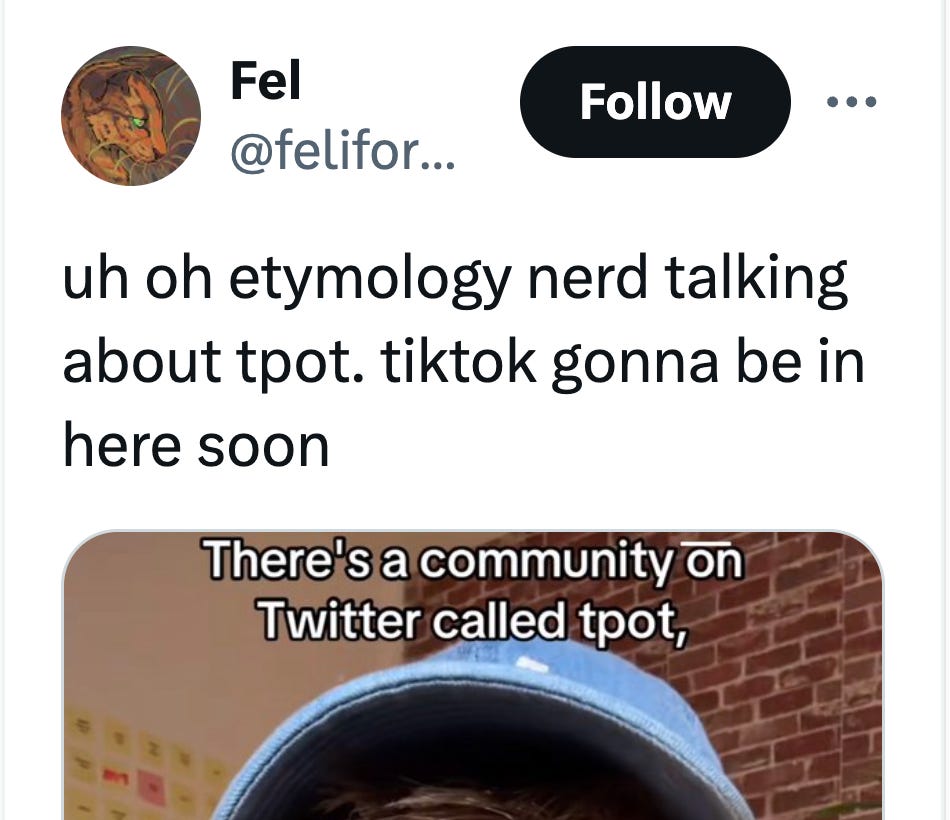
Q: What were we testing?
A: We wanted to know if tpot could “hear” etymologynerd,3 and whether they would endorse or reject his description of them.
In doing so, we demonstrated a way to take a live measurement in memetics. This is a way of testing for information silos.
Note the assymetry here:
What etymologynerd says about tpot is heard by tpot
What tpot says about etymologynerd is NOT heard by etymologynerd’s audience
This assymetry can be, and often is, exploited to spread false narratives about a particular group. etymologynerd could have said completely false thing about tpot (either maliciously, or due to lack of awareness), and his audience would believe them, because they cannot “hear” the target being discussed.
Any time I notice this assymetry, I am immediately skeptical of the information (again, it doesn’t make me assume the person is lying, but even if they were in good faith, they could make mistakes, and they’d have no way to know).
There is a second layer to this test: people in tpot wanted to know, how did he find out about tpot?
The reason they were asking this question is because his description of the culture was surprisingly accurate. This is unusual because tpot is not a very legible culture. If you understand it, then you’re part of the culture. And if you’re part of the culture, then you know that they don’t like to broadcast themselves to the mainstream.
Now, describing a community that does not wish to be described is typically a hostile act. You are bringing unwanted attention to them. But if you are part of the community, then it’s okay.
So it’s not that etymologynerd made a video about tpot from the outside. He collaborated with tpot. He found the nearest “open memetics” station inside the subculture, contacted them, ran his script by them, brainstormed it together, then launched it.
This then then became an opportunity for the “open memetics” cluster inside tpot to measure ITSELF against the tpot egregore. Based on the results, I think the information networks look kind of like this:
the main point is that the group of people who knew the full “behind the scenes” was very small. Which tells us that the “open memetics” / “defender” cluster is fairly on the periphery of tpot’s awareness
one major thing wrong with this diagram is that the defender / memetics culture is itself NOT fully inside tpot. Many of the people who follow me (here on substack, or on twitter) don’t know what tpot is. But I don’t know what cultures those people are inside, I have not yet mapped that out yet.
I made a quick twitter poll today. Out of the people who know of the etymologynerd video, and who know what tpot is, the majority of them were not aware of our open memetics experiment.
his description of the culture was surprisingly accurate
By this I meant that he explained tpot from an “insider’s” view. There are a lot of things about tpot that are true, but are not very flattering. An objective piece of journalism about tpot would NOT make tpot happy, because it wouldn’t represent how people in the community see themselves.
I basically hoped etymologynerd would make a video that, to tpot would read like this:
“hi, I see you! But I’m not a hostile entity! *waves white flag*”
And I think it worked:
The part about tpot popularizing the word “vibe” I think is actually NOT true (would need a more careful analysis to find out), but it is certainly flattering to tpot, which helped this video signal “good faith”.
Here is the full timeline of how this came together:
I gave at a talk at Adam Mastroianni’s “blog summit” in NYC April 11, where I first met etymologynerd
I met him again in NYC a few months later. He had never heard of tpot, I think he was only vaguely aware of rationalists/LessWrong
I invited him to the Open Memetics discord (which is open to the public)
On August 1st he asked:
how would you guys define the group that constitutes "tpot"
Defender, Xiq, Myk, AbstractFairy all gave their individual definitions
He released the video later that day and we waited to see if it’ll make its way across to that part of twitter
What’s next?
Right now there is a small number of people on earth who are aware of both etymologynerd & defender. The fact that most of his audience is NOT aware of me potentially gives us another shot at testing this. He could try saying something flattering but inaccurate about Defender & Open Memetics to see if anyone will correct him.
Playing this kind of theater is the equivilent of companies doing phishing campaigns to their employees as a security test. Etymologynerd has already proven that his audience is happy to be psyopped as a test, as long as he reveals afterwards what the results were.
The other direction we could go here is to try this with a completely different community. We’d just need to setup an “open memetics base station” there, tell them that it’s coming, and then give it a go.
Long term, if we get good at this, we could probably conduct assessments of how healthy an information/epistemic environment is, for any given community on earth. We don’t need everyone to know what memetics is, just need “one of each”, just enough people in each target community4.
There is another psyop I have cooking, but this one is more of an accident. Right now, across all of twitter, across intellectual circles, many of whom have never even heard of “open memetics” or any of my work, have a watermark on their essays that says “api.omarshehata.me”.
Some of these are really popular, and on any given day that I search, there’s always a fresh one in the last few hours:
Who is Omar? And how did he get his name plastered all over twitter like this? That is a story for next time.
One of the most exciting things he is doing is doing live experiments on his audience, then explaining them aftwards. Like this one where he explains his social experiment for how to get his audience to help promote his book for him.
Essentially ever since I made this anonymous “Defender” account on twitter. My first tweet was July 18, 2023
It’s almost like an “awareness test” for egregores. Like mimicking a bird call and seeing if the bird responds.
When I wrote “Hank Green is a memetic engineer”, I didn’t hear from Hank Green, nor anyone who is part of Hank’s audience. This tells me that his egregore cannot “hear me” (or possibly did hear me but chose not to respond, it’s inconclusive).
One thing you could search for are “memory holes”, as Eneasz Brodski describes in “Memory Holes are signs of Epistemically Hostile Enviroments”. I think the optimal number of memory holes in a healthy society is NOT zero, as I discussed in this essay about cases in which truth can be damaging, which is why it’s necessary to do this work in collaboration with a “memetics station” inside the culture you’re studying.
Like I said, there are a lot of true things about tpot that are not flattering. There is no reason to broadcast those true things to people outside the community. It may be helpful to understand those things within the community, but not everyone needs to dwell on them there either.


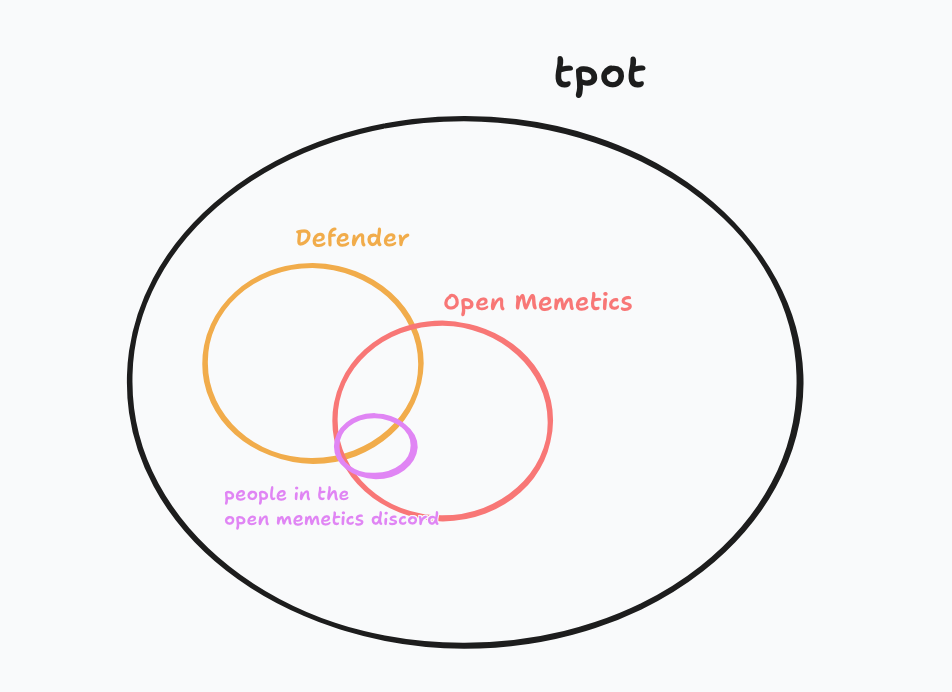

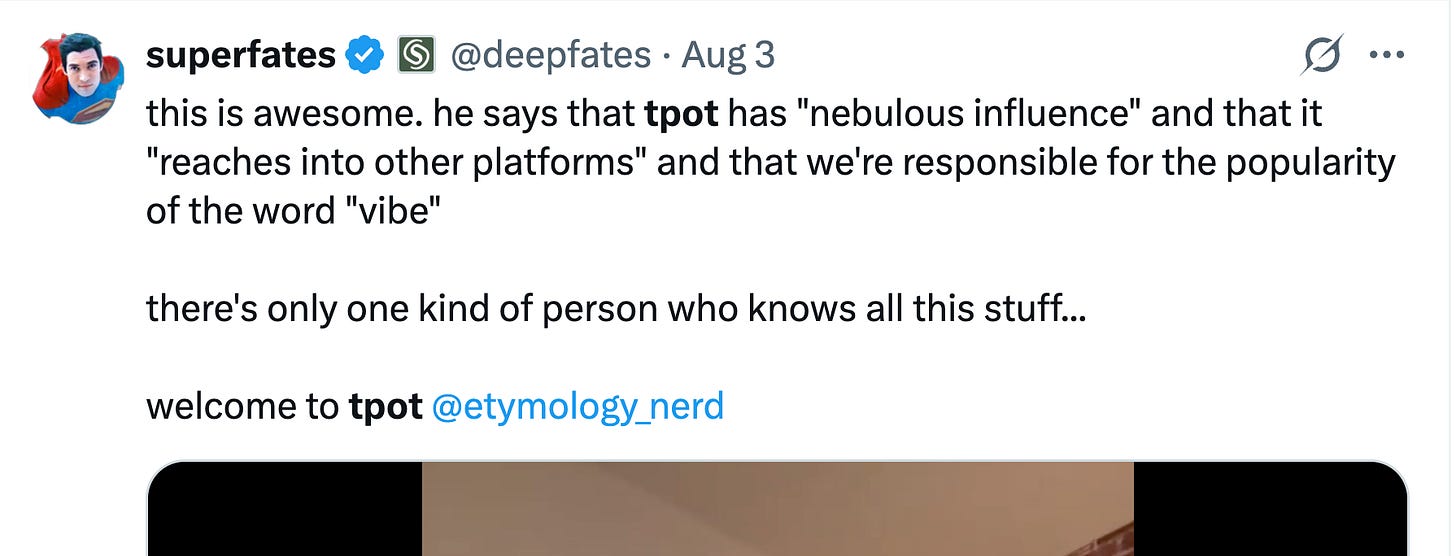
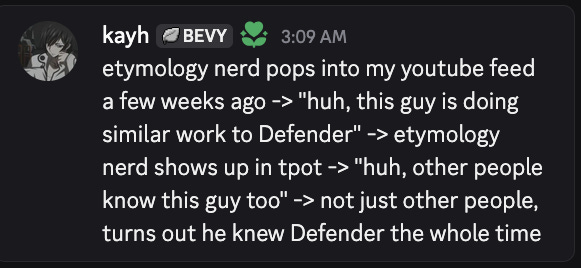
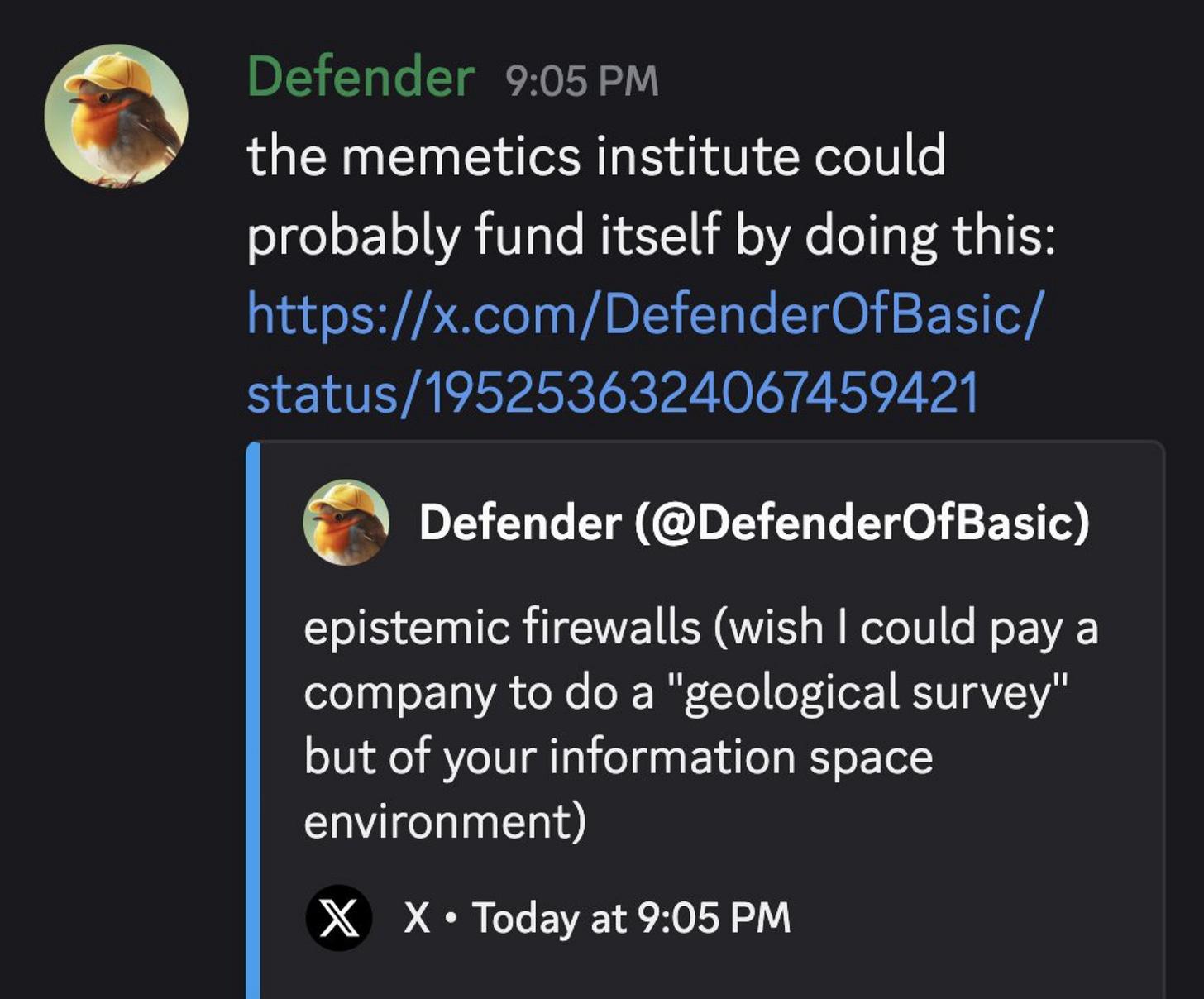

As an aside, TPOT (though I'm off of x now) is really one of the coolest Internet cultures around. Hyper elite in a way that is scary. I feel like I was constantly hearing ideas and knowing things before mainstream.
I never thought of it as being an illegible community, but when I think of how you need to understand rats to get postrats, and the way ppl think and communicate in TPOT I'd say it's a strangely illegible group, where the bar of entry doesn't demand a certain culture beyond basic western stuff. Which is wierd.
I love witnessing this work in action.
Go team!